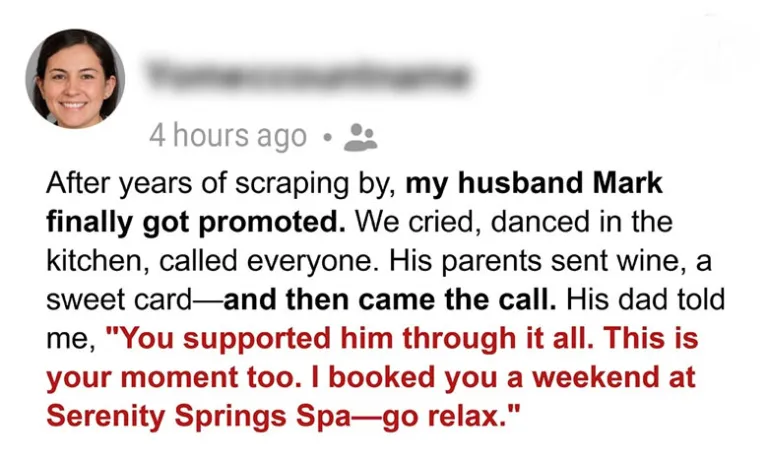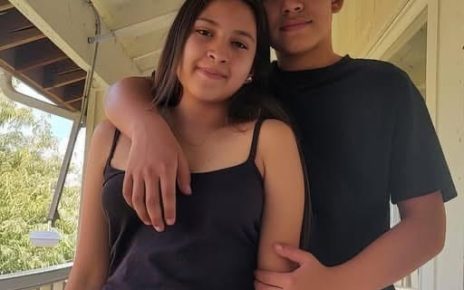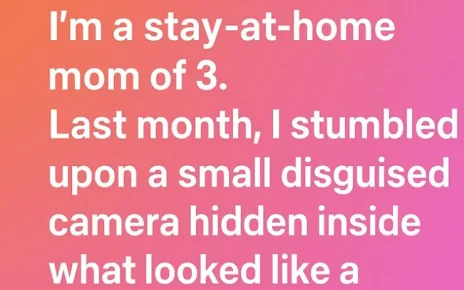I used to think milestones made people kinder. When Mark finally got his promotion, I believed it even more. We cried on the kitchen tiles, danced with bare feet and sticky palms, called anyone who’d ever cheered us on. His parents sent a bottle of Merlot and a card with embossed doves. Then his father called me.
“You supported him through it all,” Bashir said, voice warm enough to soften stone. “This is your moment, too. I booked you a weekend at Serenity Springs. Go. Let us spoil you.”
It was out of character. In the five years I’d been married to their son, his parents had treated me like I was a temporary guest in a permanent house. Polite. Cool. Measuring. But Mark squeezed my shoulders. “Let them do something nice,” he urged. “For once.”
So I packed a bag, kissed him, and merged onto the freeway while the sun burned off the last of the morning fog.
Forty-five minutes later, my phone vibrated so violently it nearly jumped out of the cup holder. Mrs. Dorsey—our retired neighbor with binoculars for eyes and a heart of gold—was screaming.
“TURN AROUND! GO BACK! THEY’RE IN YOUR HOUSE! IT’S A SET-UP!”
I didn’t ask which “they.” I U-turned so hard my coffee sloshed. By the time I pulled into our driveway, my hands were shaking the way they did the first night I brought my son home from the hospital—equal parts fear and adrenaline.
I threw open the door and froze.
Vira was in my living room holding a Sharpie and a stack of labels like a general marking territory. Bashir stood over our coffee table, paging through our photo albums with surgical attention. Open storage bins ringed the couch. The ottoman was gutted. My file folders fan-spread across the cushions like cards in a magician’s trick. A journal—my journal, with a blue ribbon—lay face down on the rug, spine cracked.
“Hey, honey,” Vira sang, as if I’d caught her frosting cupcakes. “You’re back early! We were just tidying. A surprise!”
Bashir didn’t even attempt the smile. He glanced at her, then at me, then down at the photos—evaluation layered over embarrassment.
“Where’s Mark?” I asked.
“Oh,” Vira said lightly, “he’s…running errands. He’ll be back soon.”
“You don’t have a key.”
“Mark gave us his,” Bashir said, flat as a stamp.
Something cold lifted off the floor and settled in my chest.
I walked back outside. I didn’t slam the door. I didn’t indulge their script. On the fourth call, Mark finally answered.
“Hey, babe,” he said, too casual. “Everything okay?”
“You gave your parents a key to our house?”
A beat. “Uh. Yeah. For emergencies.”
“They are in our house. Right now. Digging through our things.”
Another beat, longer. “Listen,” he said quickly, “it’s not what it looks like.”
People only say that when it is exactly what it looks like.
By the time he got home an hour later, I’d locked myself in our bedroom and stacked a chair under the knob like that would do anything against paper cuts. He knocked, pleaded, offered the word “help” so many ways it collapsed into nonsense. “We’re moving up,” he said. “My parents just wanted to organize things. Old-fashioned generosity.”
This wasn’t kindness. It wasn’t culture. It was choreography. And I had almost danced right off the stage.
After they finally left and Mark fell asleep breathing like a man who hadn’t told the truth all day, I sat cross-legged on the guest bed and began to take inventory. The files had been shuffled. A copy of my son’s birth certificate—missing. The statement from my grandmother’s small inheritance—gone.
They hadn’t been tidying. They’d been casing.
I took two days off work and told Mark I needed quiet. Then I called Mrs. Dorsey back. She was sorry, sorry, sorry, and then she told me: “I was walking Churro when I saw Bashir unlock your door. I know y’all didn’t give them a key. Then I saw them bring in big plastic bins. Not suitcases, honey. Bins. Like storage.”
Storage. Not a visit. A transfer.
The next call I made was to my friend Rhea at a small real-estate firm. “Humor me,” I said, already nauseous. “Is there any property paperwork with my name on it I don’t know about?”
Her email arrived thirty minutes later with three attachments and the subject line: CALL ME NOW.
Three weeks earlier, a quitclaim deed had been filed. It transferred my half of our home—my half—to Mark. My name. My signature. My handwriting.
But not mine.
The witness? “V. Anwar.” His mother.
I steadied myself on the kitchen counter and watched the afternoon light wobble on the wall. My body knew before my brain did: this wasn’t panic; this was rage.
When I confronted Mark, he didn’t deny it. He rubbed his temples and said, “It’s just a precaution. My parents helped with the down payment. They wanted to protect the house. In case something happened. In case you…left.”
“In case I left?” I laughed once, the sound bouncing off tile. “So you forged my name to ‘protect’ yourself from a future you invented.”
“It’s not like that.”
It was exactly like that.
I packed a duffel with jeans and two sweaters and the folder of documents they hadn’t yet found. I went to Rhea’s. I lawyered up. Mr. Thakkar had the patience of a monk and the eye of a hawk. We hired a handwriting expert. We pulled bank records. We discovered three more forged documents—two authorizations targeting accounts I’d opened before our marriage and one attempt to revoke my existing power of attorney over Mark’s assets. Each signature looped and leaned like mine, familiar enough to fool a clerk who processes dozens a day.
A quiet war is still a war.
We prepared to press charges. We were meticulous because paper crimes hide in the margins. And then life, indifferent and timely, cut in.
Bashir was diagnosed with late-stage pancreatic cancer.
Now Mark called with a voice I didn’t recognize. “He wants to make things right,” he said, splintering on the last word. I thought it was a play. Maybe it was. Maybe it wasn’t. Grief makes everyone honest and strange.
We met in my living room, the same room where they had sorted my life into bins. Mark sat between his parents, leaned forward like a bridge that wasn’t sure it could hold the weight. Vira kept her eyes on the coffee table. Bashir looked…smaller. Not just thinner. Smaller, like the angles of him had collapsed.
“I did what I thought was right,” he said. “You never accepted us. You kept yourself apart. I thought you’d leave and take the house.” He swallowed hard. “I was wrong.”
He pushed a folder across the table with hands that trembled in time with his breath. Inside: a sworn affidavit admitting to the forgeries. A notarized revocation of the deed transfer. Letters to the bank rescinding the sham authorizations. A list of documents stolen and returned. Dates. Signatures. Notarials that bit into the paper.
It wasn’t forgiveness. It was accountability. And then he died three weeks later, fast as a sentence with no comma.
I didn’t go to the funeral. I sent lilies and a note Mark didn’t answer.
We didn’t reconcile. We didn’t burn it all down, either. We sold the house clean, with title scrubbed and restored. I kept my inheritance. He kept his promotion. The criminal side went away when the restitution became a matter of record and the DA realized the person responsible had signed his confession and then signed out of this world.
Sometimes justice looks like a gavel. Sometimes it looks like a notarized apology and a medical chart.
I moved into a small townhouse with big windows and a corner for my son’s books when he stays over. Mrs. Dorsey brings muffins every other Sunday—blueberry, always—and tells me the new neighbors don’t stir up half as much “excitement.” Churro still barks at mail trucks like they’re invading armies. Rhea visits with cheap wine and expensive gossip. Mr. Thakkar sends holiday cards featuring his cat.
As for Mark—he looks older now when I see him at mutual friends’ things. Not aged by time so much as by knowledge. He knows where the line is. He knows he crossed it. He knows he can’t pretend it was love when it was fear.
Because that’s really what it all was. Not greed. Not tradition. Fear. They thought I would take what they thought they had given. They believed love was collateral and a marriage a ledger. They confused legacy with control.
They forgot the simplest math: trust is the only equity that compounds in a marriage. Forge it once and the interest is ruinous.
So no, I don’t hate them. I hate the choices they made from bad stories they told themselves about me. But hate is heavy, and I’m done carrying other people’s furniture.
I rebuilt. From the foundation. With my name. In my handwriting.
If this stirred something in you, pass it on. Someone out there is ignoring a wobble in the floorboards. They might need to hear that you can stop the dance, step outside, and choose yourself—paper and all.




